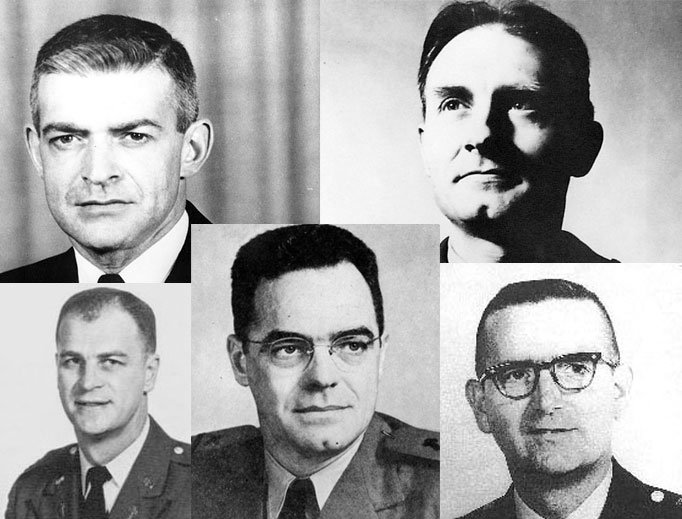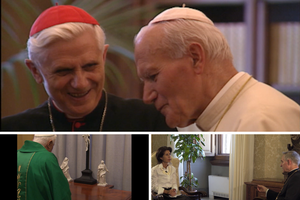Faith Under Fire: Remembering Heroic Catholic Chaplains
Acts of valor. Supernatural faith in the face of death of Medal of Honor recipients.

Acts of valor. Supernatural faith in the face of death.
Five Catholic chaplains have received the nation’s highest military award — the Medal of Honor. Two of them also have their causes for sainthood underway.
As Memorial Day is solemnly marked across the United States May 28, the Register remembers these heroic chaplains, recalling their remarkable bravery and their courageous response to the needs of their fellow men in war.
Father Joseph O’Callahan was the first Catholic chaplain to receive the Medal of Honor. His friends couldn’t imagine this Jesuit, head of the math department at Holy Cross College in Worcester, Massachusetts, who suffered from claustrophobia and nearsightedness, would become a Navy chaplain during World War II, let alone receive such an honor.
They protested when, at age 36 in 1940, he applied for a chaplaincy in the Navy as war loomed. Soon, he was serving aboard an aircraft carrier in the Atlantic Theater.
Transferred to the Pacific, Father O’Callahan was a lieutenant commander aboard the aircraft carrier USS Franklin on the morning of March 19, 1945, the feast day of his patron saint. Off the coast of Japan, at 7:07am, as planes loaded with bombs were on the flight deck and others that were fueled and armed were waiting in the hangar below, a lone Japanese plane dropped two 500-pound bombs.
Because the carrier was loaded with a high concentration of explosives, those two blasts caused a continuous chain of explosions and blazes that would end up killing more than 800 sailors. But Father O’Callahan nevertheless rushed into the blaze to give last rites, comfort, aid and encouragement.
Wounded by shrapnel, he refused to leave the wounded and dying without expending every effort to aid them. Ignoring his minor wound, he organized firefighting teams and led men to remove stockpiles of bombs and rockets around the ship and jettison them into the sea. Despite his claustrophobia, he led a party into a gun turret to remove all the shells packed in it and toss them overboard before they exploded. He was the last man out.
“This undoubtedly saved the ship,” the Franklin’s commanding officer, Capt. Leslie Gehres, said in a magazine article years later. “If that had blown, it would have blown the bridge; it would have blown me and the senior officers up there.”
Only two days later did the valiant chaplain fall asleep from sheer exhaustion as he was removing bodies for burial.
His Medal of Honor citation describes him as a “valiant and forceful leader, calmly braving the perilous barriers of flame and twisted metal to aid his men and his ship. … [W]ith debris and fragments raining down and fires raging in ever-increasing fury, he ministered to the wounded and dying, comforting and encouraging men of all faiths. … Serving with courage, fortitude and deep spiritual strength, Lt. Cmdr. O’Callahan inspired the gallant officers and men of the Franklin to fight heroically and with profound faith in the face of almost certain death and to return their stricken ship to port.”
When the battered carrier finally limped back to the Brooklyn Navy Yard in New York in April 1945, the crew was on deck and the Navy invited Father O’Callahan’s mother, Alice, to greet them.
Capt. Gehres went to her and announced, “Your son is the bravest man I have ever seen.” He would repeat this later as: “The bravest man I ever knew was Cmdr. Joseph T. O’Callahan.”
The modest chaplain answered, “Any priest, in like circumstances, should do, and would do, what I did.”
Father O’Callahan received the Medal of Honor Jan. 23, 1946, and returned to teach at Holy Cross.
A decade later, in a book on his experiences, he wrote: “God knows I am not, as a man, more courageous than others, nor did I, in fact, perform more deeds of courage than many others. … But I did what had to be done. I was conscious of my office as a priest and conscious of the tremendous graces that continually sustained me in fulfilling that office. Whatever I did was given me to do.” He died March 18, 1964.
Father Vincent Capodanno, a Maryknoll priest and Navy chaplain known as “The Grunt Padre,” received his Medal of Honor posthumously in 1969 for actions in Vietnam on Sept. 4, 1967, while he was serving with the Marines during “Operation Swift,” when 300 Marines faced 2,000 Vietnamese in a fierce battle.
As the overwhelming enemy force was about to attack the 2nd Platoon of M Company, Father Capodanno ran through an open area filled with small arms, automatic weapons and mortar fire, moving across the battlefield to give last rites to the dying and medical help to wounded.
“When an exploding mortar round inflicted painful multiple wounds to his arms and legs and severed a portion of his right hand, he steadfastly refused all medical aid,” notes his Medal of Honor citation. “Instead, he directed the corpsmen to help their wounded comrades and, with calm vigor, continued to move about the battlefield as he provided encouragement by voice and example.”
Years later, wounded Marine Ray Harton recalled seeing the priest who came to his aid on the battlefield, “When I looked, it was Father Capodanno. He was down on his knees, his left arm behind my head. He said in a real calm voice, ‘Stay calm, Marine. Someone will be here to help soon. God is with us all here today.’ There was no pain. No fear.” He added that he just felt the “peace that came over me.”
Severely injured, Father Capodanno then rushed to a wounded corpsman 15 yards from an enemy machine gun, which opened fire. The chaplain took 27 bullets. Today, with his cause for canonization open, he is Servant of God Vincent Capodanno.
Father Charles Watters was an Army major during the Vietnam War. On Nov. 19, 1967, the 2nd Battalion, 503rd Infantry was engaged in fierce fighting around Dak To.
Chaplain Watters’ citation for his medal describes how he moved in front of advancing troops, administering last rites, aiding the wounded and helping evacuate them.
He “ran through the intense enemy fire to the front of the entrenchment to aid a fallen comrade … exposed himself to both friendly and enemy fire between the two forces in order to recover two wounded soldiers.”
Later, seeing several wounded soldiers lying outside the new perimeter, unhesitatingly, he ran three times to the wounded to carry them back, despite fierce automatic weapons and mortar fire from both sides. With the wounded safe, he gave “spiritual and mental strength and comfort” until “he himself was mortally wounded.” His medal was awarded posthumously in 1969.
Father Angelo Liteky received his Medal of Honor in November 1969 for “exceptional heroism while serving with Company A, 4th Battalion, 12th Infantry, 199th Light Infantry Brigade” near Phuoc-Lac, Bien Hoa, when the troops came “under intense fire from a huge enemy force,” according to the award citation.
“Inspired by his courageous actions, the company rallied and began placing a heavy volume of fire upon the enemy’s positions,” his citation reads.
“In a magnificent display of courage and leadership, Chaplain Liteky began moving upright through the enemy fire, administering last rites to the dying and evacuating the wounded. Noticing another trapped and seriously wounded man, Chaplain Liteky crawled to his aid” and then stood unprotected “in the face of hostile fire” to direct medivac helicopters in and out. He “personally carried over 20 men to the landing zone for evacuation during the savage fighting.”
With the wounded safely out, he returned to the front to encourage and inspire the soldiers, despite his own neck and foot wounds. His actions “saved the lives of a number of his comrades and enabled the company to repulse the enemy.”
In 1975, Liteky left the priesthood, became a peace activist and changed his name to Charles James “Charlie” Liteky. In 1985, he returned his Medal of Honor, leaving it at the Vietnam War Memorial in Washington. He is the only known recipient to return this medal.
Father Emil Kapaun, an Army chaplain with the rank of captain who died during the Korean War, was posthumously awarded the Medal of Honor April 11, 2013.
The recognition came just days short of what would have been his 97th birthday and more than 60 years after he died May 23, 1951, in a prisoner-of-war camp in Pyoktong, North Korea.
With his cause for canonization underway, he is Servant of God Emil Kapaun.
Father Kapaun acted heroically in the face of the most brutal treatment and conditions that began after the 8th Cavalry regiment was captured in November 1950 during the Battle of Unsan, North Korea. The medal citation describes how, “as Chinese Communist Forces viciously attacked friendly elements, Chaplain Kapaun calmly walked through withering enemy fire in order to provide comfort and medical aid to his comrades and rescue friendly wounded from no man’s land.”
Father Kapaun not only disregarded heavy gunfire to tend to the injured and save the wounded on the battlefield, but he volunteered to stay with the men when the Chinese communists were about to capture them.
He even pushed aside a Chinese soldier who was about to shoot a fallen GI. He then picked up the soldier and brought him to safety without either of them being shot.
Once in the POW camp, “Even though he was ordered not to and they threatened to shoot him if he did, he went around to other huts, scrounged food, cared for the wounded, all with complete disregard to himself,” Mike Dowe, an Army lieutenant imprisoned with Father Kapaun, told the Register before the 2013 ceremony.
“This guy did one thing after another for a good six months before they finally killed him. He saved close to a thousand lives.”
Father Kapaun talked to the other GIs like one of them, prayed with them, kept their attitudes positive and stimulated their will to live despite the horrendous conditions they all faced, said Dowe before the ceremony.
When he became ill, his captors, troubled by his fearlessness, carted him off to the POW “hospital,” from which no one left alive.
“He’s the greatest man I knew,” recalled Dowe.
“There are about 1,000 people who came back because of him.”
Joseph Pronechen is a Register staff writer.
- Keywords:
- joseph pronechen
- memorial day
- military chaplains
















